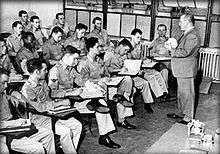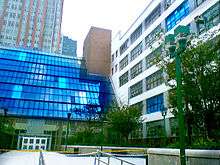New York City College of Technology
Coordinates: 40°41′45″N 73°59′17″W / 40.695778°N 73.987974°W
 | |
| Type | Public |
|---|---|
| Established |
1946 (as New York State Institute for Applied Arts and Sciences) |
| Endowment | $12 million[1] |
| President | Russell K. Hotzler |
| Provost | Bonne August |
Academic staff | 425 Full Time, 1,049 Part-Time[2] |
| Students | 17,000+[2] |
| Location |
Downtown Brooklyn, New York, USA (MetroTech BID & DUMBO) |
| Campus | Urban |
| Colors | Blue & Gold |
| Athletics | Yellow Jackets |
| Website | http://www.citytech.cuny.edu/ |
City Tech (New York City College of Technology) is the City University of New York’s college of technology. Founded in 1946.
Brooklyn's Tech Triangle
City Tech is located within Downtown Brooklyn’s city Triangle.
Students and faculty
City Tech has an enrollment of more than 17,000 students in 66 baccalaureate, associate, and specialized certificate programs including several engineering technology fields as well as architecture, construction, nursing, hospitality management, entertainment technology, dental hygiene, vision care technology, technology teacher training and paralegal training. Non-degree continuing education is also offered, and serves approximately 14,000 students each year. City Tech is accredited by the Middle States Commission on Higher Education.
History
City Tech was founded in 1946 as The New York State Institute of Applied Arts and Sciences. The urgent mission at the time was to provide training to GIs returning from the Second World War and to provide New York with the technically proficient workforce it would need to thrive in the emerging post-war economy. No one in 1946 could have predicted the transformation the College has experienced. From its beginnings as an Institute—to being chartered as a community college—and subsequently transitioning to senior college status during the 1980s—it has grown from serving 246 students in 1946, to a population today of more than 30,000 degree and non-degree seeking students.
Former names | The New York Trade School (1881–1961), The Technical Schools of the Metropolitan Museum of Art (1880) |
|---|---|
| Type | Private |
| Active | 1881–1971 (acq. by New York City Community College of City University) |
| Location | New York City, New York, USA |
| Campus | Urban |
Former names | The New York State Institute for Applied Arts & Sciences (1946–1953) |
|---|---|
| Type | Public |
| Active | 1946–1964 (Joined City University System) |
| Location | Brooklyn, New York, USA |
| Campus | Urban |


Timeline
• 1881 - The Technical Schools of the Metropolitan Museum of Art is renamed the New York Trade School to more precisely reflect its curriculum (after the art education program is moved to a separate school).
• 1892 - Financier J. Pierpont Morgan sizably endows the New York Trade School. Over the next 60 years it gains a reputation as the nation’s leading trade school for American young men and the model upon which other trade schools are founded.
• 1946 - The New York State Institute of Applied Arts & Sciences is founded in response to the needs of business, industry and the professions for highly trained technicians and other specialists for the post-war economy.
• 1953 - The institute is renamed New York City Community College, becoming the city’s first community college.
• 1961 - The New York Trade School’s charter is amended, making it a “technical institute.” It is renamed Voorhees Technical Institute in honor of Enders M. Voorhees, a prominent industrialist and chairman of its board of trustees. Its charter now allows the school to grant associate in applied science degrees and to operate as a two-year college.
• 1964 - New York City Community College is made part of The City University of New York (CUNY).
• 1965 - Voorhees Technical Institute first begins accepting female students.
• 1971 - Voorhees Technical Institute is incorporated into New York City Community College.
• 1980 - New York City Community College is designated “a technical institute within the CUNY system" and is renamed New York City Technical College (City Tech). It offers 27 career programs.
• 1983 - New York City Technical College is authorized to grant its first baccalaureate degree in hotel and restaurant management.
• 2002 - New York City Technical College is renamed New York City College of Technology, offering 50 career-specific baccalaureate, associate and specialized certificate programs in the technologies of art and design, business, computer systems, engineering, entertainment, health care, hospitality, human services, the law-related professions, career and technology teacher education, and the liberal arts and sciences.
• 2014 - The introduction or approval of additional bachelor's degree and specialized certificate programs brings City Tech’s offerings to 66.
Schools and departments
School of Technology and Design
Departments
- Advertising Design & Graphic Arts
- Architectural Technology
- Computer Systems Technology
- Construction Management & Civil Engineering Technology
- Electrical Engineering Technology
- Entertainment Technology
- Environmental Control Technology
- Mechanical Engineering Technology
School of Professional Studies
The eleven departments housed in the school provide instruction at the associate and baccalaureate levels, leading to degrees in the areas of healthcare, business, hospitality, paralegal studies, human services and career and technology teacher education.
Departments
- Business
- Career & Technology Teacher Education
- Dental Hygiene
- Restorative Dentistry
- Health Services Administration
- Hospitality Management
- Human Services
- Nursing
- Law/Paralegal Studies
- Radiologic Technology & Medical Imaging
- Vision Care Technology
- Business Technology
- Biomedical Informatics
School of Arts and Sciences
The School of Arts and Sciences is home to a number of majors: transfer degrees in Liberal Arts and Liberal Arts and Science, associate degrees in computer science and chemical technology, and the baccalaureate degree in applied mathematics. The school is also home to a new and rapidly growing bachelor's degree program in Biomedical Informatics, which is at the intersection of IT and biomedical research.
Departments
- African American Studies
- Biological Sciences
- Biomedical Informatics
- Chemistry
- English
- Humanities
- Liberal Arts & Sciences (AA/AS)
- Mathematics
- Physics
- Social Science
Campus



City Tech occupies nine buildings within Downtown Brooklyn's Tech Triangle, MetroTech BID and DUMBO. College Administration and Offices, the Ursula C. Schwerin Library, the School of Professional Studies, and the School of Arts & Sciences are primarily based in a complex formed by the Namm, Atrium, General, and Pearl buildings in MetroTech (300 Jay Street). The School of Technology & Design is primarily based in Voorhees Hall in DUMBO with Graphic Arts based in the MetroTech Complex.
In October, 2013, City Tech held a ceremonial groundbreaking to mark the construction of a new 350,000 square foot academic complex at the corner of Tillary and Jay Streets in Downtown Brooklyn. The new complex will rise on the site formerly occupied by Klitgord Center.
The new eight-story academic complex, which is currently unnamed, will be home to City Tech’s expanding programs in healthcare and the sciences. The departments that will be moved into the new building include the core sciences: Physics, Chemistry and Biological Sciences (including Biomedical Informatics). It will also be home to the health programs: Nursing, Radiologic Technology & Medical Imaging, Dental Hygiene, Restorative Dentistry, and Vision Care Technology. Included in the plans is a 1,000-seat concert hall quality auditorium, which when opened will be the largest of its kind in Downtown Brooklyn. A wellness center and faculty office space will also be located in the new space.
Athletics
City Tech teams participated as a member of the National Collegiate Athletic Association's Division III. City Tech began CUNYAC competition in the community college section from the conference's inception in the 1987-88 season, later to join its senior college section in the 1999-2000 season. Men's sports included basketball, cross country, soccer, tennis and volleyball; while women's sports included basketball, cross country, softball, tennis and volleyball. City Tech's athletic program is in hiatus until new facilities are available.
Notable alumni
- Hiroaki Aoki (Restaurant Management, 1963), Olympic wrestler and founder of the Benihana chain of "Japanese steakhouse" restaurants
- Eric Adams, Borough President of Brooklyn (2014 - )
- Charles Barron, New York City Council member representing the 42nd District of New York City; former Black Panther
- Zev Brenner, an Orthodox Jewish radio host; president and founder of Talkline Communications
- Salvatore Cassano (Fire Protection, 1970), New York City Fire Commissioner
- Larry R. Felix (1980), Director of the Bureau of Engraving and Printing
- Michael Lomonaco (Hotel and Restaurant Management, 1984), chef, restaurateur, and television personality. He is also a Visiting Distinguished Professor.
- William Yosses (Hotel Management), White House Executive Pastry Chef and coauthor of the book Desserts For Dummies.
- Julian Niccolini (Hospitality Management) Managing Partner, The Four Seasons Restaurant, http://www.fourseasonsrestaurant.com/people.php
- Samuel E Vázquez (1991), Abstract Expressionist Painter
Notable faculty
- Frank McCourt, the Pulitzer Prize-winning author of Angela's Ashes, taught in the English department. In a 1997 New York Times Op-Ed essay, Mr. McCourt wrote about his experiences teaching immigrant mothers at New York City Technical College during the Spring 1990 semester.[3]
References
- ↑ , US News & World Report America's Best Colleges, rankingsandreviews.com
- 1 2 http://www.citytech.cuny.edu/files/aboutus/facts.pdf
- ↑ McCourt, Frank (11 May 1997). "Mothers Who Get By". The New York Times. Retrieved 2009-07-23.
External links
| Wikimedia Commons has media related to New York City College of Technology. |
| ||||||||||||||